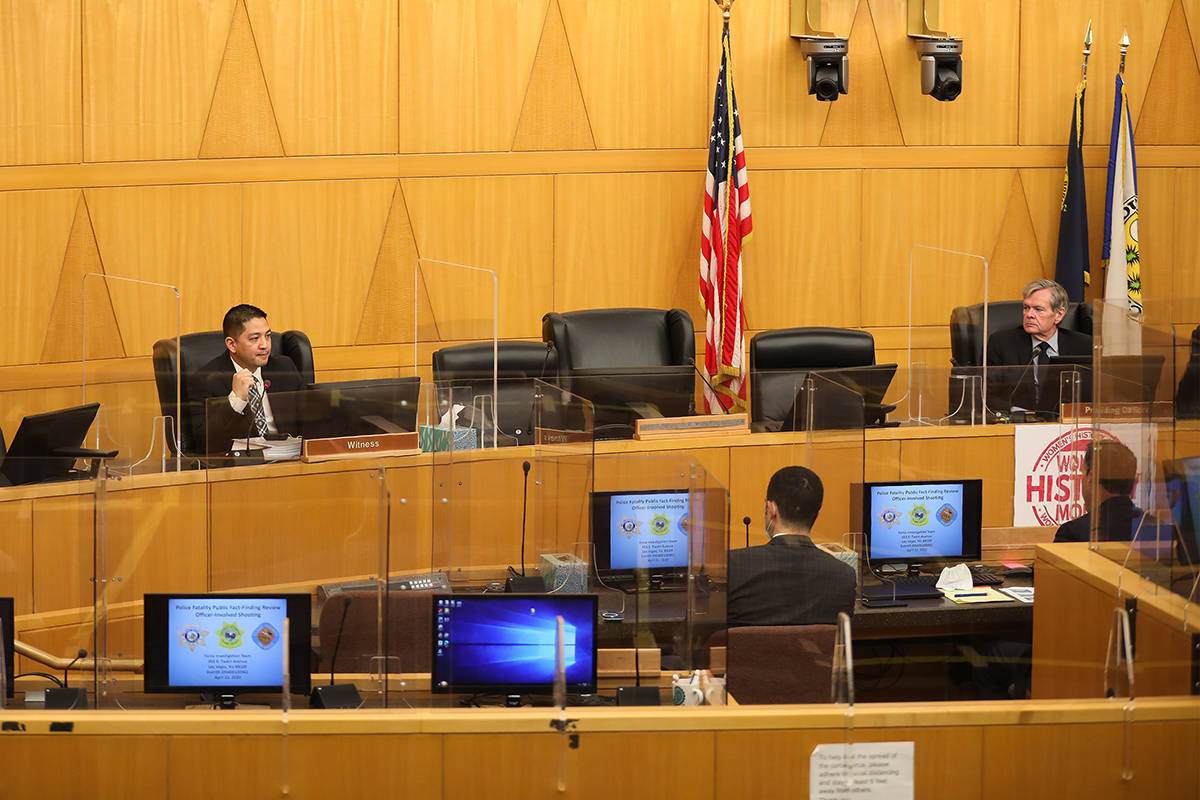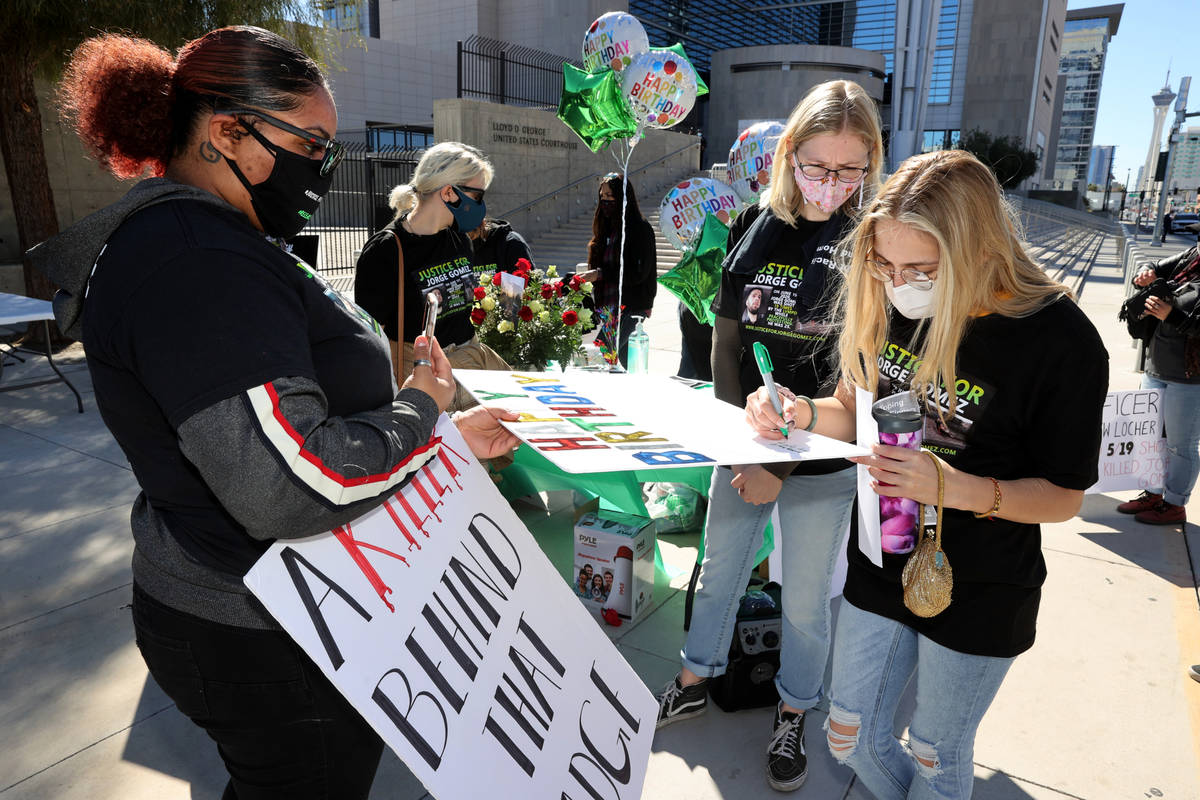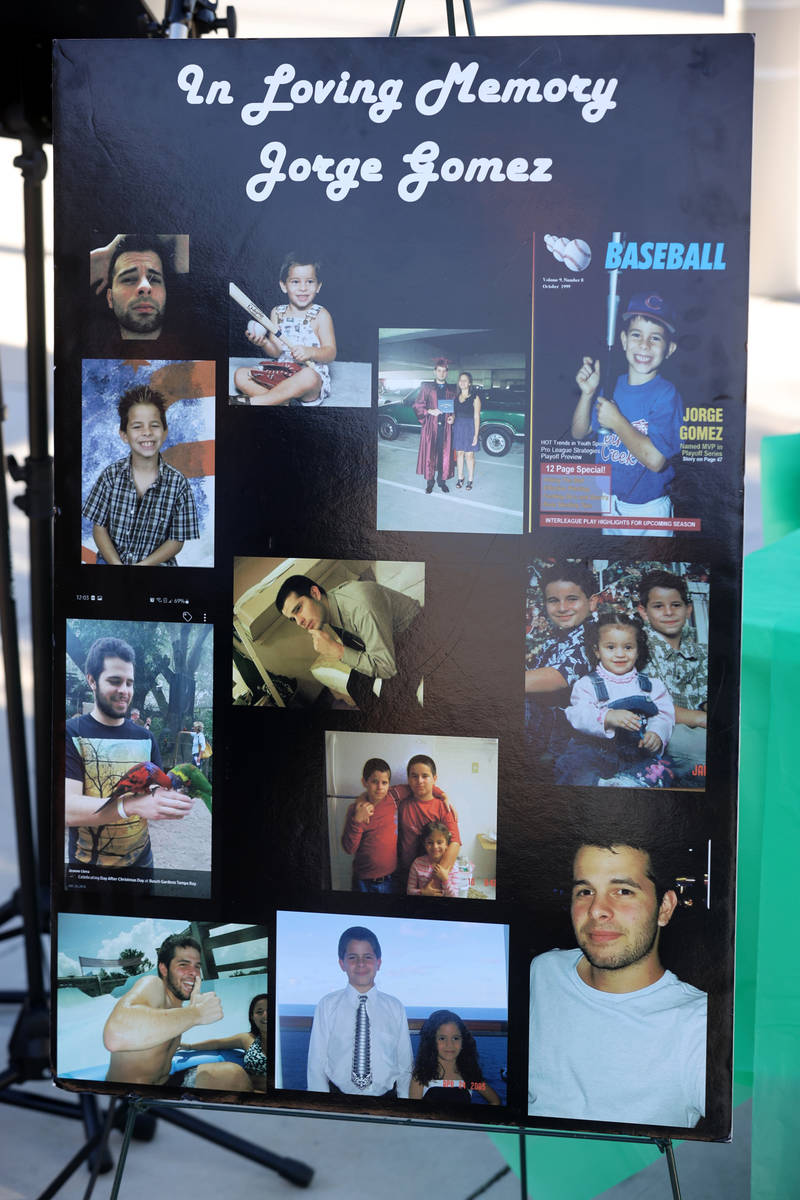Why is a fact-finding review held after a police killing?
George Floyd’s killing last year in Minneapolis police custody set in motion a wave of protests against police brutality and racism around the country, including in Nevada.
On June 1, the third straight night of major demonstrations in Las Vegas, protester Jorge Antonio Gomez was shot and killed by four Metropolitan Police Department officers outside the Lloyd George U.S. Courthouse. The officers were not wearing body cameras.
In the 10 months since Gomez’s death, calls from his relatives and activists for charges against the officers, as well as questions surrounding the shooting, have remained unanswered.
But on Friday morning, amid ex-Minneapolis police officer Derek Chauvin’s murder trial in the killing that prompted Gomez to take to the streets of downtown Las Vegas nearly a year ago, both Metro and the Clark County district attorney’s office will have to answer to the public.
A fact-finding review of evidence in Gomez’s killing will be held at 8 a.m. Friday inside the Clark County Commission chambers.
But what is a fact-finding review? What is the purpose of this obscure procedure? And why are they held?
The fact-finding review, which is required by Clark County ordinance, was adopted in 2013.
Here is an overview of the process:
■ After a deadly police shooting or in-custody death, a police detective will investigate the use of force and complete a report that is submitted to the district attorney’s office for review. Typically, a detective within the same agency involved in a death is responsible for completing the investigative report, although, in Southern Nevada, the Nevada Highway Patrol refers all of its deadly force cases to Metro “to ensure complete transparency,” spokesman Travis Smaka said.
■ Once an investigative report has been submitted, the district attorney will assign the case file to a senior prosecutor in the office’s major violators unit.
■ Upon the prosecutor’s review, the district attorney will gather about a dozen of his most senior prosecutors for a meeting, during which the prosecutor initially assigned to the report will brief the team on the case. “We look at all the evidence,” District Attorney Steve Wolfson said. “Then, during that staffing, an internal preliminary determination of either criminality or non-criminality is made.” The former would lead to criminal charges, while the latter would trigger a fact-finding review.
■ Ahead of a review, the Clark County manager will select a presiding officer and an ombudsman, who will represent the interests of the public and the family of the person who was killed. Both are chosen from a list preapproved by the Clark County Commission.
■ At the review, which is open to the public and livestreamed on the county’s YouTube channel, a Clark County prosecutor will give a presentation that typically involves the informal questioning of the detective responsible for investigating the death. In many cases, the presentation also will include previously unreleased body camera footage or 911 audio.
■ After the presentation, the ombudsman has a chance to ask questions before members of the public are given the opportunity to submit proposed questions in writing. The presiding officer reviews all proposed questions from the public and can decline to ask a question if it is deemed irrelevant or redundant.
■ The district attorney’s office does not make any further determinations or decisions on the day of the review. But within about two weeks, the district attorney will make a final decision about whether charges will be filed against an officer or officers in connection with a death. A report outlining the final decision is then posted on Clark County’s website.
‘Not a perfect process’
Law enforcement officials have said the fact-finding review is a win for transparency in fatal police shootings and in-custody deaths.
But some say the process is merely an act of theater that favors law enforcement.
“I’m not going to say there’s no rhyme or reason for this procedure,” said Athar Haseebullah, executive director of the American Civil Liberties Union of Nevada, “because if done effectively and transparently, I think it would make a lot of sense. But there’s little faith right now in the ability for the DA’s office to actually prosecute. It seems to be a process that doesn’t do anything more than greenlight underlying police misconduct.”
In the near decade that the procedure has been in place, not a single preliminary determination has been overturned following a fact-finding review, and only one police officer has been charged in connection with a death. Friday’s review will mark the 86th held in the county since the process was adopted.
Last summer, amid the wave of national protests after Floyd’s death, Clark County’s district attorney told the Las Vegas Review-Journal that the procedure “is probably ripe for review to determine if any more improvements could be made.”
“It is not a perfect process,” Wolfson said at the time, “because the involved officers that caused the death of one of our citizens cannot be forced to testify.”
Even so, ahead of Friday’s review, Wolfson defended the process.
“This is an important case,” he said of Gomez’s killing. “It’s getting a lot of attention. All we want is for the truth to come out.”
Metro’s version of events that led to the fatal shooting vastly differs from the picture painted by surveillance video released in February by a team of civil rights attorneys retained by Gomez’s parents.
The Police Department claims Gomez, who was armed on the evening he was killed, raised a weapon at a group of officers stationed outside the federal courthouse, prompting four officers driving by on Las Vegas Boulevard to exit their vehicle and fire a combined 19 rounds. The officers — Ryan Fryman, Dan Emerton, Vernon Ferguson and Andrew Locher — have since returned to duty.
Video captured by nearby surveillance cameras in the area shows Gomez running, with his back turned to the officers, just before he was shot. Gomez’s family and their attorneys faced a lengthy battle with Metro for months before the department turned over the videos.
Before the fact-finding review
The fact-finding review was adopted after a failed overhaul of the coroner’s inquest, the previous procedure to probe police killings that had been in place for four decades. Under the previous system, officers were required to testify, and at the conclusion, an inquest jury would determine whether a death at the hands of law enforcement was justified.
Changes to the coroner’s inquest were approved in 2011, and would have allowed an ombudsman representing the family of the victim to cross-examine witnesses, including officers. But police unions sued and vowed that officers wouldn’t participate.
The Nevada Supreme Court upheld the reforms, but because of the lengthy legal battle, no public probes on police killings had been held for two years. In light of the backlog, according to Review-Journal reports at the time, county commissioners adopted the fact-finding review process — one that requires almost no police involvement and could begin immediately.
Now, in the absence of first-hand accounts from officers, families typically hear only from the detective who was assigned to investigate his or her colleagues.
“To see a person’s life reduced to a PowerPoint presentation after they’re killed by police,” said Haseebullah, the ACLU executive director, “what sort of solace is that supposed to provide Gomez’s mother, who has been asking for answers to her questions for nearly a year?”
If Clark County’s law enforcement officials want to tout transparency, Haseebullah said, cases of deadly police shootings and in-custody deaths should be handled by outside prosecutors.
Such is the case in Minneapolis, where, to avoid the appearance of a conflict of interest, metro area county district attorney’s offices adopted a new practice last year for fatal police shootings.
According to the Star Tribune, the practice calls for the county attorney in the jurisdiction where a shooting takes place to refer the case to another county or to the state attorney general’s office.
Contact Rio Lacanlale at rlacanlale@reviewjournal.com or 702-383-0381. Follow @riolacanlale on Twitter.

























